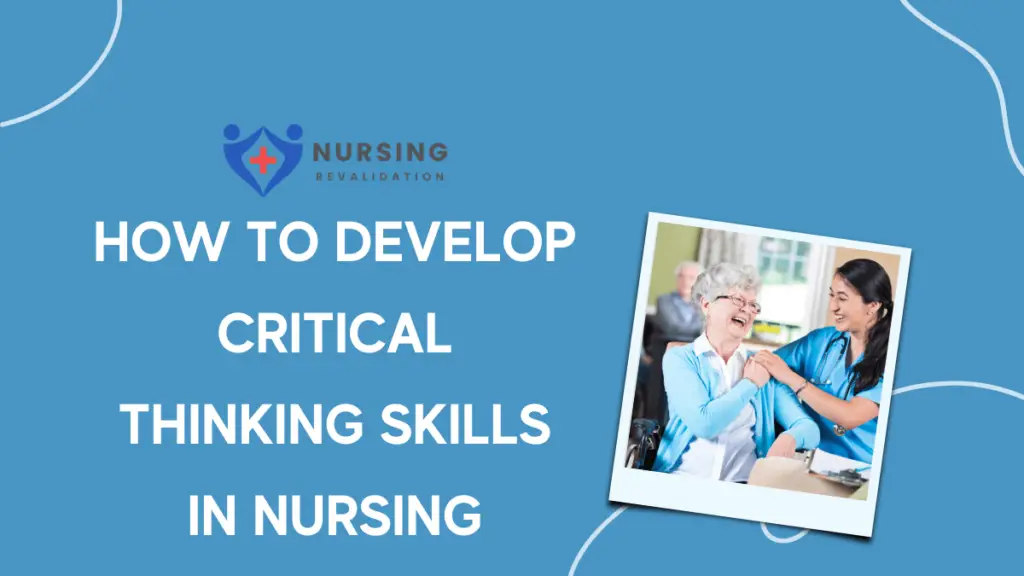In the dynamic and challenging field of nursing, critical thinking skills are indispensable. Nurses face complex situations daily, where quick and accurate decision-making can be a matter of life and death. Developing robust critical thinking abilities is not only essential for providing optimal patient care but also for professional growth and advancement in the nursing career. In this comprehensive guide, we delve into the strategies and techniques that nurses can employ to enhance their critical thinking skills effectively.
Understanding Critical Thinking in Nursing
Critical thinking in nursing involves the ability to analyze situations, evaluate information, and make reasoned decisions to deliver safe and effective patient care. It encompasses various cognitive processes such as reasoning, problem-solving, decision-making, and clinical judgment. Nurses with strong critical thinking skills can identify patient needs, anticipate complications, and adapt to evolving healthcare environments efficiently.
Table: Comparison of Strategies for Developing Critical Thinking Skills
| Strategy | Description |
|---|---|
| Continuous Education and Training | Engage in ongoing professional development activities to broaden knowledge and enhance skills. |
| Clinical Experiences and Simulation | Practice critical thinking in realistic healthcare scenarios through hands-on experiences. |
| Reflection and Self-Assessment | Analyze clinical experiences, identify areas for improvement, and develop self-awareness. |
| Collaborative Learning | Engage in interdisciplinary communication and teamwork to gain diverse perspectives. |
| Clinical Decision Support Tools | Utilize technology-enabled resources for evidence-based decision-making at the point of care. |
| Mentorship and Preceptorship Programs | Learn from experienced professionals through guidance, feedback, and role modeling. |
The Importance of Critical Thinking in Nursing Practice
Critical thinking is the cornerstone of evidence-based practice in nursing. It enables nurses to integrate current research findings, clinical expertise, and patient preferences to deliver individualized care that aligns with best practices. Moreover, critical thinking fosters a culture of continuous learning and improvement within healthcare teams, leading to better patient outcomes and enhanced job satisfaction among nurses.
Strategies for Developing Critical Thinking Skills
- Continuous Education and Training: Engaging in ongoing professional development activities such as workshops, seminars, and online courses can broaden nurses’ knowledge base and enhance critical thinking abilities. These opportunities provide exposure to new concepts, evidence-based practices, and innovative strategies for problem-solving.
- Clinical Experiences and Simulation: Hands-on clinical experiences and high-fidelity simulations offer valuable opportunities for nurses to apply critical thinking skills in realistic healthcare scenarios. Simulated patient encounters allow nurses to practice clinical judgment, prioritize interventions, and refine decision-making processes in a safe learning environment.
- Reflection and Self-Assessment: Encouraging reflective practice enables nurses to analyze their clinical experiences, identify areas for improvement, and develop self-awareness regarding their thinking processes. Journaling, peer feedback, and structured debriefing sessions facilitate critical self-assessment and promote continuous growth as a nurse.
- Collaborative Learning and Interprofessional Collaboration: Engaging in collaborative learning activities with colleagues from diverse healthcare disciplines fosters interdisciplinary communication, teamwork, and critical thinking skills. By sharing perspectives, brainstorming solutions, and seeking input from experts in other fields, nurses can gain valuable insights and enhance their problem-solving abilities.
- Utilization of Clinical Decision Support Tools: Leveraging technology-enabled clinical decision support tools and resources can augment nurses’ critical thinking capabilities by providing access to evidence-based guidelines, algorithms, and decision-making frameworks at the point of care. These tools facilitate information synthesis, risk assessment, and clinical reasoning, thereby empowering nurses to make informed decisions efficiently.
- Mentorship and Preceptorship Programs: Participating in mentorship and preceptorship programs allows novice nurses to benefit from the expertise and guidance of seasoned professionals. Mentors serve as role models, providing constructive feedback, sharing clinical wisdom, and challenging mentees to think critically and autonomously in challenging situations.
Conclusion
Developing critical thinking skills is an ongoing journey for nurses, requiring dedication, practice, and a commitment to lifelong learning. By employing a combination of educational, experiential, and collaborative strategies, nurses can cultivate the cognitive abilities necessary to navigate the complexities of modern healthcare delivery effectively. Embracing critical thinking not only enhances patient care outcomes but also empowers nurses to thrive in their professional roles and contribute meaningfully to the advancement of nursing practice.

